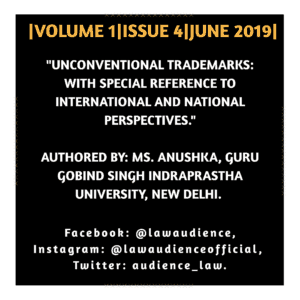Authored By: Ms. Sarahna Ekka (B.A.LL.B (Hons)), The West Bengal National University of Juridical Sciences.
I. INTRODUCTION:
Agency problems arise when there is a conflict of interests in any given relationship where one party is expected to act in the best interests of the other party. In the corporate world, agency problem refers to a conflict of interests between the company’s management and its members. This is where corporate governance comes in to handle the issue of alignment of interests. Members’ rights are best protected when the interests of the company and its Directors are closely aligned. The Director is supposed to make decisions that will maximize the company’s profit rather than seek to fulfil one’s own personal interests. The response to this problem is manifold–whether it be internal reforms by bringing in Independent Directors to the company, or putting more emphasis on disclosures so as to keep a check on the Directors.
The Board has a duty to perform, which is to make sure that business is conducted in a way that supports and represents the interests of everyone. More often than not, there is always a sense of mistrust regarding the independence of these Boards. There are so many instances of insider trading, embezzlements and corporate fraud where Directors (who were insiders to the company) were involved.[1] This is why the independence of Directors is the need of the hour-to make sure that the company’s activities are taking place in an equitable and impartial manner. Independent Boards are efficient in the sense that they have little to no personal interests; they are very professional in their dealings and are not easily influenced by the personal interests (if any) that they might have. They work towards the company’s interests, rather than working as puppets in the hands of other influential members, or even trying to achieve their own personal agendas. The whole idea is to incorporate more non-interested parties into the Board to ensure the true independence of the Board, and also to put forth the interest of the company as a whole, rather than individual interests.[2] The author will work with the hypothesis that:
“There is always a conflict of interests within a company, so the appointment of Independent Directors is better than having a traditional (insider) board.”
II. SCOPE OF THE PAPER AND RESEARCH METHODOLOGY:
The purpose of the paper is to critically analyze whether there exists a conflict between the interests of the company with that of its Directors. This paper discusses the solutions to when conflicting interests arise, i.e., what needs to be done for the alignment of such varied interests. This paper also talks about how the origin of the relationship between the company and its Directors is found in the Law of Agency, and how it can be equated to the principal-agent relationship. It will also shed light on the fiduciary obligations resting upon the Independent Directors vis–à–vis the company. Multiple methods of data collection have been used in order to capture a comprehensive picture of the alignment of interests of directors versus independent boards. These will include a reading of valuable literature published in journal articles, stories from news, reports as well as academic studies undertaken by various authorities, legal provisions, etc.
III. WHAT ARE THE AGENCY PROBLEMS THAT ARISE?
One of the fundamental characteristics of the businesses conducted in a company is the detachment of control from ownership. In other words, the owners of the company (i.e., the shareholders) do not partake in the functioning of the company’s affairs, because that is taken care of by the Board of Directors, Managers, and other dignitaries. It is important that such segregation exists because the entrusted authorities are more efficient while the owners may not actually have the knowledge nor interest in handling the business. This is why agents, i.e., the Directors are needed, to minimize the abuse of power of the owners in running the company.[3]
The Directors, upon being entrusted with the company’s dealings, also have the power to make discretionary plan-of-actions for personal gains at the cost of harming the company-this is how agency problems arise, and hence there is a need for keeping ownership separate from control. The Directors may indulge in insider trading, negotiating for personal gains, non-disclosure leading to information asymmetry, etc. They could also pretend to work for the company’s interests but in reality, may have ulterior motives in fulfilling one’s own interests. This happens so often because the shareholders are oblivious of to what transpires in the board meetings, and this creates the possibility of abuse of power by insider boards.[4]
The other issue that arises is when there are clear-cut majority and minority shareholders in a company-the majority of shareholders have more power in decision making as compared to the minority shareholders. This means that the majority is able to appoint a Board of Directors of their choice, and influence them to take decisions in their favour without paying any heed to the interests of the minority. This agency problem shows the disparity between the majority and the minority in any company.[5]
To overcome such problems, there has been an increase in incorporating Independent Boards, i.e., those which mainly have Independent Directors who are dissociated from the company in terms of personal ties. This is done in an attempt to align their interests with that of the company, so that things like insider trading, scams, personal agendas, etc don’t crop up, and that the company runs efficiently and smoothly. Independence like this helps the Board to work properly without feeling pressurized by other members or CEO as compared to a traditional Board of Directors which comprised of insiders. They have no personal obligation nor ulterior motives and this helps to combat the agency problem in a legitimate manner.[6]
IV. BOARD INDEPENDENCE: REALITY OR ILLUSION?
The independence of the Board of Directors of a company is always under strict scrutiny because the primary question is whether the board is truly independent or not, and secondly, even after this independence, whether the Independent Board is effective and efficient vis–à–vis the traditional Insider Board or not.
In order to be truly independent, the Board Members must not keep any personal ties with the company which may put them in a compromising position in any future event. To understand this, one looks are the nature of the relationship the Independent Director has with the company and its members, whether personal or social. At time prejudices do form due to social obligations that a Board Member may have, and it is crucial to ensure that no such personal ties are involved, because the Independent Board has a higher responsibility of that of a guide, who watches over the company’s affairs with a fair hand and without getting personally involved. At this juncture, an Independent Director must be unfazed by social and personal pressures so as to work in his/her best capacity towards the interests of the company.[7]
Furthermore, there may be issues of bias based on the company’s structure, on account of the company following the same structure since its foundation. Apart from this, incentivization the job of Independent Directors and tailor-made selection process of committee members might cause favouritism to occur. While this issue cannot be eradicated completely, yet the Independent Directors should not fear the superior members or other parties to the company as clearly, they do not have any personal obligations and are involved only professionally.[8]
If the Board fails to operate autonomously, then the shareholders of the company will have no reason to rely on these Independent Boards-which is a failure, as the replacement of traditional Board of Directors with an Independent Board was meant to be the solution to cure agency problems. Instead of fixing the old agency problems, such uncertainties within a company will only cause new agency problems to occur.
V. ALIGNMENT OF INTERESTS AS A CURE FOR AGENCY PROBLEMS:
There are various suggestions which can be sought as solutions to solve agency problems. In this part of the project, certain methods of aligning the interests of Independent Boards have been discussed.
As mentioned time and again in the previous sections of the project, an Independent Director must have as little attachment to the company as possible. This is negated if he/she has a large number of shares. Evidently, the shareholding power can be said to be directly proportional to the interest in the company-this makes the ‘Independent Director’ less independent. The interests of the Directors and the interests of the shareholders must be aligned in such a manner that they have a similar outlook on stock ownership, which in turn compels the Directors to safeguard the interests of the shareholders as now they are on the same page financially. This is a feasible solution, yet it is always best that the Independent Board has minimum ties with the company even in the case of shares, so that arbitrariness doesn’t happen again.[9]
Another way to curb corporate scams and insider trading is by aligning the interests of all the parties of a company on ‘moral grounds’, rather than just mere company rules and regulations. Penal sanctions may not have that great an effect as ethical codes, in the sense that the Independent Directors would now feel morally obliged to work in an honest manner for the good of the company at large. They would have a sort of fiduciary obligation, and would be less likely to deviate towards self-interests and would focus more on the collective interests of the company, if such a framework is adopted.[10]
Even though it is said that stockholding can have an influential impact on the Independent Board, yet from another point of view it can be seen as an incentive in return for their diligent work. Sometimes working for their own benefit can also lead to working for the benefit of the shareholders, thus, encouraging the Independent Board with stock ownership may not be such a bad thing after all. At least they will work towards a common goal of the company, unlike in the case of Insider Directors where they can be seen working for their own agendas and benefits.[11]
Additionally, emphasis can be done on disclosures. If there’s a provision in the company’s regulations for mandatory disclosures, then it would have a positive impact by way of avoiding information symmetry and discouraging self-dealing, embezzlement, etc. Corporate transparency would ensure that the company’s actions would be observable by the general public and would make open the information privacy and business policies concerning decision-making and other operations to everyone who is concerned with it. This would dissuade Directors from acting for their own personal gains and would compel them to work for the greater good of the shareholders and the company. The Directors should be more involved in the company’s dealings so as to avoid chances of information asymmetry.[12]
The shareholders are not to be neglected in this scenario. The discussion till now has been mainly on how, to reduce agency cost, companies focus more on the separation of control and ownership. But one cannot overlook the part of shareholders here, as even they have an important part to play. If the needs of the shareholders are dismissed then it gives more power to the Board to act on its own whims and fancies. Hence, to stop such a thing from happening, the interests of the shareholders are to be taken into consideration too-to see that they are aligned well with the interests of the Directors, and also that the shareholders don’t get to misuse it by quashing the objectives and interests of the corporation. There should be no discrimination between the majority and minority shareholders and everyone’s interests should be treated at par.[13]
VI. LEGAL PROVISIONS AND POSITION IN OUR COUNTRY:
Companies in India tend to have one dominating shareholder as the majority shareholder, with other smaller shareholders comprising of the minority. It is usually one person with a lot of power, or a group of persons, or a family-owned business, or even the Government. In such cases, the absolute maximum authority lies with the single powerful shareholder, and that body has the power to make all the decisions of the company, which thereby means that appointment of the Board of Directors is done as per the wishes of this body.[14]
Thus, there are innumerable instances of the existence of Insider Boards when it comes to Indian companies. By virtue of their controlling power, the single powerful shareholder and the Insider Board are hand-in-glove with each other, have a deep-rooted bond which runs over a course of many years. There is not much of a difference in control and ownership of these companies.[15]
Section 2(47) of the Companies Act defines an Independent Director as “an independent director referred to in sub-section (6) of section 149”[16]. Section 149(6) says in its sub-sub-sections (a) to (f) defines an Independent Director as someone other than managing director/whole-time director/nominee director who has integrity and professional know-how; a person who is unrelated to the company, nor has relatives in the company, nor he or his relatives possess key managerial positions, and nor has he or his relatives ad any pecuniary relationship or transaction with the company.[17] Section 150[18] talks about the manner of selection of the Independent Director and even section 135[19], which is all about corporate social responsibility, emphasizes that the type of company mentioned in that section should have at least one director in its Board of Directors who is an Independent Director.
Although the Act takes into consideration the Independent Directors, yet the provisions do not provide adequate measures which would help in the alignment of interests.
VII. CONCLUSION:
In the corporate world, there is a great need to solve agency problems. To tackle the agency problems, there are two solutions: first, you align the interest of the Directors with that of the company by giving them share in the profit, more remuneration, or in other ways for example just rewarding them to make the correct decision (i.e. a decision which would benefit the company). So incentivising them to take decisions which are in the interest of the company, then basically you are aligning their interests with that of the company because then their interests in siphoning off the funds are taken over by the reward that they will get for not siphoning. This is a method of cutting off the problem at the roots.
The other solution to tackle agency problems to have Independent Boards which will keep a check. When outside directors are favoured over insiders, then Independent Directors are introduced. This is a good option as in this case, the whole effort is directed not towards cutting the problem at the roots by way of alignment of interests of the Directors, but rather towards solving the problem as it happens-that when the hazard exists, the company is able to tackle the issue as it arises.
It is a reaction to organizational expenses and helps the Board of Directors to beware of the functioning of the administration of the corporations by working impartially. Autonomy like this, be that as it may, is vulnerable to a large group of predispositions which may act as an obstacle to the performance of the Directors to act reasonably and freely. This type of a situation could bother the agency problem, putting the investors at further hazards. To keep such plausibility from emerging, the interests of the Independent Directors should be lined up with that of the corporation and its investors. One method for doing this which has demonstrated in the past is through the support of such Directors in value responsibility for the company which will viably adjust their own beliefs to the best of interests of the company and its investors. All these methods will act as an incentive for the Independent Directors to act equitably and openly, free from the coercion of other influential members. This would also protect the rights of the minority shareholders in Indian companies.
In this manner, the law must try to guarantee that such an arrangement can happen. The law in India at present enables the Directors to claim just a small measure of stocks in the corporation, and for the purpose of aiding alignment of interests; it can and should be further increased.
List of Authorities:
Statutory Provisions:
- The Companies Act, 2013, §135(1).
- The Companies Act, 2013, §149(6).
- The Companies Act, 2013, §150.
- The Companies Act, 2013, §2(47).
Journal Articles:
- Anupam Chander, Minorities, Shareholder and Otherwise, 113 Yale L.J (2003).
- Gloria Phillips-Wren, Assessing the Impact of Corporate Board Independence and Diversity on Team Decision-Making, 27 Journal of Decision Systems (2018).
- Lisa M. Fairfax, The Uneasy Case for the Inside Director, 96 Iowa Law Review (2011).
- Mark Anson, Theodore White and William McGrew, Aligning the Interests of Agents and Owners: An Empirical Examination of Executive Compensation, Ivey Business Journal (2004).
- Sharifah Faatihah Syed Fuzi, Syahrina Adliana Abdul Halim and M.K. Julizaerma, Board Independence and Firm Performance, 37 Procedia Economics and Finance (2016).
- Umakant Varottil, Evolution and Effectiveness of Independent Directors in Indian Corporate Governance, 6 Hastings Business L. J. (2010).
Online Materials:
- Brent Fisse (Professor of Law at the University of Sydney), Fraud and the Liability of Company Directors, https://aic.gov.au/sites/default/files/publications/proceedings/downloads/10-fisse.pdf.
- Chron, Conflicts Between Corporate Management and Shareholders, January 25, 2019, available at https://smallbusiness.chron.com/conflicts-between-corporate-management-shareholders-75063.html.
- Patricia Lenkov, These Are The Corporate Board Mistakes You Can’t Afford To Make, FORBES (Feb. 18, 2019), https://www.forbes.com/sites/patricialenkov/2019/02/18/these-are-the-corporate-board-mistakes-you-cant-afford-to-make/#526ac8a4311f.
- Robert Shaftoe, Conflicts Between Corporate Management and Shareholders, CHRON (Jan. 25, 2019), https://smallbusiness.chron.com/conflicts-between-corporate-management-shareholders-75063.html.
- Simon Renshaw, What Disclosures are Issued during Administration? COMPANY DEBT (Aug. 29, 2018), https://www.companydebt.com/company-rescue-solutions/company-administration/disclosures-need-made-administration/.
Reports and Studies:
- Edward S. Herman, Corporate Control, Corporate Power: A Twentieth Century Fund Study (Cambridge University Press 1981), http://cas2.umkc.edu/ECON/economics/faculty/Lee/courses/602/readings/enterprise2.pdf.
[1] Brent Fisse (Professor of Law at the University of Sydney), Fraud and the Liability of Company Directors, https://aic.gov.au/sites/default/files/publications/proceedings/downloads/10-fisse.pdf.
[2] Robert Shaftoe, Conflicts Between Corporate Management and Shareholders, CHRON (Jan. 25, 2019), https://smallbusiness.chron.com/conflicts-between-corporate-management-shareholders-75063.html.
[3] Edward S. Herman, Corporate Control, Corporate Power: A Twentieth Century Fund Study (Cambridge University Press 1981), http://cas2.umkc.edu/ECON/economics/faculty/Lee/courses/602/readings/enterprise2.pdf.
[4] Lisa M. Fairfax, The Uneasy Case for the Inside Director, 96 Iowa Law Review (2011).
[5] Anupam Chander, Minorities, Shareholder and Otherwise, 113 Yale L.J (2003).
[6] Patricia Lenkov, These Are The Corporate Board Mistakes You Can’t Afford To Make, FORBES (Feb. 18, 2019), https://www.forbes.com/sites/patricialenkov/2019/02/18/these-are-the-corporate-board-mistakes-you-cant-afford-to-make/#526ac8a4311f.
[7] Gloria Phillips-Wren, Assessing the Impact of Corporate Board Independence and Diversity on Team Decision-Making, 27 Journal of Decision Systems (2018).
[8] Fairfax, supra note 3.
[9] Mark Anson, Theodore White and William McGrew, Aligning the Interests of Agents and Owners: An Empirical Examination of Executive Compensation, Ivey Business Journal (2004).
[10] Ibid.
[11] Forbes, supra note 5.
[12] Simon Renshaw, What Disclosures are Issued during Administration? COMPANY DEBT (Aug. 29, 2018), https://www.companydebt.com/company-rescue-solutions/company-administration/disclosures-need-made-administration/.
[13] Gloria Phillips-Wren, supra note 6.
[14] Umakant Varottil, Evolution and Effectiveness of Independent Directors in Indian Corporate Governance, 6 Hastings Business L. J. (2010).
[15] Sharifah Faatihah Syed Fuzi, Syahrina Adliana Abdul Halim and M.K. Julizaerma, Board Independence and Firm Performance, 37 Procedia Economics and Finance (2016).
[16] The Companies Act, 2013, §2(47).
[17] The Companies Act, 2013, §149(6).
[18] The Companies Act, 2013, §150.
[19] The Companies Act, 2013, §135(1).



